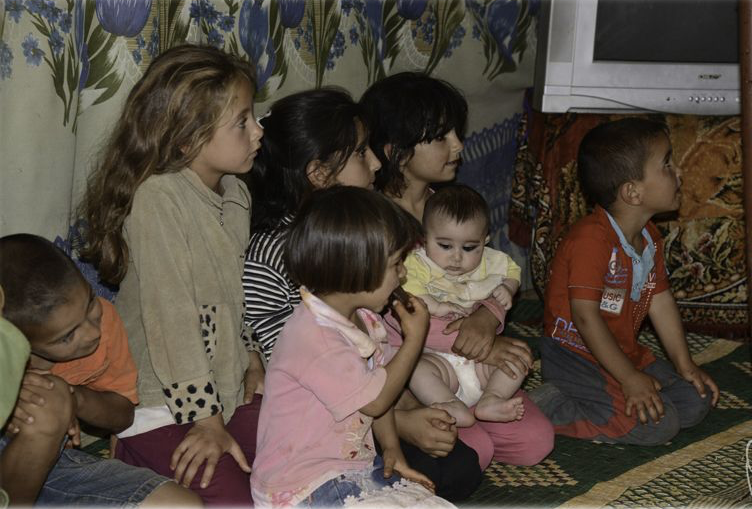Sahid is a child who is just five years old. He is originally from Syria, but he is temporarily living in Lebanon. If you try to ask him what he wants to do, he will say, “Make money, buy arms and fight.” Fatima, on the other hand, is already twelve years old and there is one thing that she is certain about: “I do not want to grow up; I do not want to become anything” These are the hopeless visions of tomorrow that Fr. Toufic Bou Merhi has to combat daily in Lebanon. The friar, as regional vicar in the Arab Province of St. Paul, and as a guardian of Saint Joseph’s Monastery in Beirut, knows his people well. He works to serve in the Parish of the Custody of the Holy Land and every weekend he travels hundreds of miles back and forth to southern Lebanon to celebrate mass at Tyre and Deir Mimas. The problems he faces are manyfold, but Fr. Toufic does not lose heart.
THE CUSTODY AND THE FATHER GENERAL IN LEBANON. The Custos of the Holy Land, Fr. Francesco Patton, also visited the Beirut monastery for three days last April and was able to meet the fraternities present and see the spiritual and material works they carry out. The Father General of the Order of Friars Minor also came with him and he sought to bring encouragement, with the knowledge that Lebanon has experienced the consequences of nearby wars. “He invited us to open the doors of the monasteries and to go outside,” Fr. Toufic recalled. “His invitation to open up was like that of Pope Francis who invited [friars] to go to the suburbs. As Franciscans, we must be the first to embrace this Pope’s message: we must open the doors to go out and then welcome the people.”
BEING WELCOMED IN BEIRUT. The word ‘welcome’ is very meaningful to the friars of the Custody in Lebanon. In their monasteries, they practice it in various respects. “Our church of St. Joseph in Beirut is always open and known by all. They call it “the holy church,” and many go [there] for confession,” said Fr. Toufic, the guardian of the fraternity composed of three friars. In Beirut, there is also a nursery school, run by lay people, which this year had 26 children from different backgrounds and religions. Welcoming is not only for the local people, but also for the foreigners who pass through: the monastery’s rooms are always ready to welcome guests.
HARISSA, DEIR MIMAS, TRIPOLI. The Franciscan presence in Lebanon is also rooted in other monasteries: Harissa and Tripoli, in addition to the activities that take place in Tyre and Deir Mimas. In Harissa, there is a formational community composed of five friars and it is the place where pre-postulancy takes place for those who aspire to be part of the seminary in the St. Paul region. “In Harissa, we also work with three Iraqi families,” said Fr. Toufic, “and the children gather at the monastery. Activities and educational assistance are provided.” Another 14 families of Iraqi refugees have found support in Deir Mimas thanks to the Franciscans: “There are also non-Christian families, but we do not want discriminate. We give them food and health care and, moreover, we encourage their children to go to school with material help.” Projects with refugees are also carried out thanks to the contribution of the John Paul II Foundation.
Tripoli is the second city in Lebanon and Christians make up only four to six percent of the population. “Immediately after the capitular congress in the beginning of November, we reopened in Tripoli after being closed since 1976,” proudly stated the guardian of the Beirut fraternity. Two friars now live there and are committed to creating a sports center for young people because “sports are a language that know no religion.”
CHRISTIANS IN LEBANON. In addition to a total population of 4.5 million, Lebanon has another two million refugees. Most of them are Sunni Muslims and then half a million are Palestinians who came after 1948. Today, Christians in Lebanon make up about 38 percent of the population, which translate to about 1.6 to 1.8 million people. The first Christian community is the Maronite one, then the Greek Orthodox one and the Greek Catholic one. The Latin community is composed of only 15,000 people in all of Lebanon. This is why the masses of the Custody of the Holy Land are attended mainly by Christians of other rites. For young people, initiatives are different (such as summer camps or the organization of the Franciscan march), but many have a hard time [participating] as a direct result of the war.
YOUNG PEOPLE AND REFUGEES. What do the young Lebanese people need today? Fr. Toufic makes it clear: “They need to be loved, [and] this is the thing to know if you work with them. They need someone near them who shares their anxieties and hopes.” It is precisely what the Franciscan friars try to do every day, with the support of the Custody of the Holy Land and the fundamental help of the ATS Pro Terra Sancta Association.
From Lebanon, due to the hardships [they are experiencing], more and more people are emigrating to other countries. “I hope these people have a desire to come back to their country some day, but if they have to go away, [I hope that] they will not become a ‘commodities exchange,’ said the Franciscan friar. I invite you to look at them in a human manner. We do what we can here, and we try to be instruments in the hands in the Lord. We entrust him with our presence and our work.”
Beatrice Guarrera


